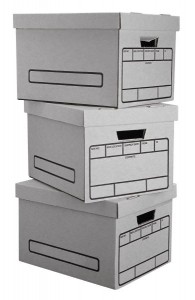
This tip sheet is designed to assist in organizing and executing a successful Records Clean-Up Day for your unit.
What is a “Records Clean-Up Day”?
A Records Clean-Up Day is a day designated to give staff members the time needed to review their files (both paper and electronic), identify records that have reached the end of their retention period as specified in the University’s Common Records Schedule and either destroy them or arrange for them to be transferred to the University Archives. It can also be used to properly file records, and to identify records to be moved to storage locations either on campus or off-site.
Tip
Dispose of transitory records regularly. Don’t wait for a Records Clean-Up Day. See Tip Sheet 3 on Transitory Records.
When is a good day to have it?
Records Clean-Up Day will vary for each unit depending on whether the unit is filing records based on an academic, calendar or fiscal year. It is up to each unit to decide on the most appropriate time of year to hold a Records Clean-Up Day. Units may wish to choose a less hectic period of the year, or a time when the unit can be closed.
How is a Records Clean-Up Day conducted?
Before the day:
- meet with the unit manager to review the process involved for the day, and get his or her commitment for resources required and any other needed arrangements
- create a team of individuals and designate a lead person to coordinate and oversee the activity
 estimate numbers of storage boxes and confidential recycling bins needed and order them in advance from Grounds, Fleet and Waste Management, CSBO
estimate numbers of storage boxes and confidential recycling bins needed and order them in advance from Grounds, Fleet and Waste Management, CSBO- notify staff about the day and send periodic reminders
- if necessary, inform the University community of the day/time when your unit will be closed to conduct the clean up
On the day:
- meet with all staff and provide them with detailed instructions on how to conduct the clean up
- distribute or direct staff to the Common Records Schedule, Tip Sheet 7 on Secure Destruction of Records and other guidance produced by the Information and Privacy Office for reference
- ensure staff review file drawers, filing cabinets, personal and shared drives, and email folders to identify those files whose retention periods have expired; remember to review files in storage
 if records are being moved into storage, make a file list before boxing them up and sending them to storage locations
if records are being moved into storage, make a file list before boxing them up and sending them to storage locations
- use the appropriate forms to list the files to be destroyed or transferred to the University Archives and obtain appropriate sign-off on the disposition of the records (N.B.: You don’t need to list or seek authorization to destroy transitory records)
Never destroy records that pertain to an ongoing or reasonably anticipated investigation, legal action or proceeding, Freedom of Information (FIPPA) request, audit or program review, even if the retention period or disposition date specified for the records has already expired.
What are the benefits of a Records Clean-Up Day?
Benefits to having a regular Records Clean-Up Day include:
- ensures compliance with the University’s Common Records Schedule (CRS)
- minimizes legal exposure (note that retaining University records longer than required can be as great a legal liability as having the records destroyed prematurely)
- eliminates duplication
- frees up space in the filing cabinets, work areas and on the computer network
- reduces storage and maintenance costs
- increases work productivity and efficiency in information search and retrieval
Best of all, Records Clean-Up Day is a great team-building activity. So get everyone in your unit involved and make it a fun experience!
Tip
To make the experience fun and get staff motivated, provide a pizza lunch, or hold a contest with prizes.
Other ideas for a successful day include:
- allowing participating staff to dress casually for the occasion
- posting flyers and event notices throughout the unit and on your unit’s website
- providing small promotional items to participants (e.g., pens, coffee mugs, tote bags, gift cards)
- consulting the Information and Privacy Office for further assistance
This document has been developed to assist in establishing good practices and procedures. Additional questions or requests for advice on records and information management or information and privacy issues should be referred to the Information and Privacy Coordinator: info.privacy@yorku.ca.

